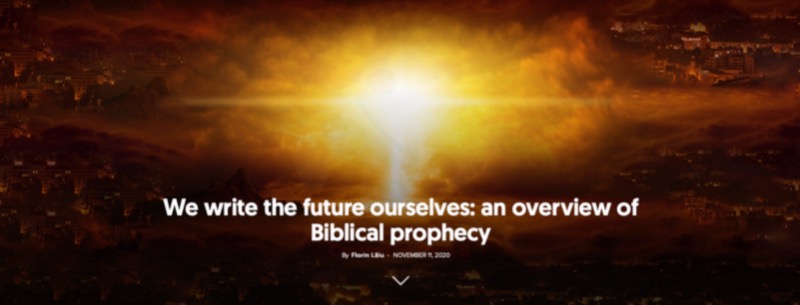Much of the Bible was written by prophets, so it is full of prophetic revelation. Most of these revelations are about mysteries of the past and present that we would not otherwise have access to.
However, many of these prophecies are revelations about the future. We could even call them “memories of the future,”[1] as Erich von Däniken would, because they describe or reflect what prophets saw in their visions of the future.
In the Bible, there is a collection of books by prophets who wrote extensively about the future of Israel and ancient peoples. Nevertheless, beginning with the book of Genesis, the historical and didactic books of the Bible also contain revelations about the future. In the New Testament we have predictive prophecies in the Gospels, the Epistles, and the book of Revelation.
Conditional and unconditional prophecy
The prophecies of the Bible are not fortune-telling or future predictions based on intuition or statistical probabilities derived from knowledge of the past and present. Nor are they horoscopes in which we can read our fate in order to cheat it by mystical trickery. They are either God’s plans or evidence of His foreknowledge.
Most prophecies are revelations of God’s plans. They are usually conditional, as God revealed them to Jeremiah (18:6-11) and other prophets (Zechariah 6:15). In some cases, auspicious promises may fail because of unbelief and disobedience on the part of those involved (Hebrews 3:16,19),[2] and in other cases they may be threats that can be thwarted if conditions change (Jonah 3:4-10).
There is, however, a category of special prophecies which are neither God’s plans nor conditional, optimistic or pessimistic scenarios, but testimonies to God’s foreknowledge and sovereignty over time and history.
These prophecies describe the future, but in a limited, schematic, and symbolic way, outlining only the major moments of the great confrontations that God’s people will endure.
To get the full picture, it should be noted that there are also unconditional classical prophecies, such as the prophecies of the first and second coming of Jesus. Jesus’ coming into the world did not depend on the goodness of people. Without His incarnation and sacrifice, humanity would have had no chance of salvation. The second coming of Jesus is also certain and does not depend on the number or quality of Christians. The only conditional elements can be time and circumstances, not the event itself.
However, there are also some conditional prophecies in the apocalyptic books (Daniel and Revelation), which in principle reveal an unconditional future. In the book of Daniel we have the conditional prophecy given to Nebuchadnezzar to be avoided by repentance (e.g. Daniel 4:27,28). In Revelation, both the seven churches and the readers are presented with conditional prophecies about the imminent coming of the Lord (e.g. Revelation 3:11; 22:20).
Why are there two views of the future?
Just as we need two eyes for a bifocal panoramic view, so we need two biblical perspectives on the future: conditional prophecy and unconditional prophecy—that is, the perspective of cooperation with God’s ideal plans and the perspective of certainty of the fulfilment of God’s plan.
In this dual prophetic perspective, the hope of personal salvation is preserved in a paradoxical balance, in which certainty is rooted only in what God has done, is doing, and will do again (Romans 5:8-11). Yet, at the same time, certainty is conditioned by a committed relationship with Him that involves obedience (John 15:4-10). Any attempt to destroy this paradox of the hope of salvation and to “simplify” things ends either in legalism (Romans 3:20; Galatians 2:21) or in a false faith (Romans 2:13; James 2:20-26).
Failure to understand both perspectives can lead to arrogance or, on the contrary, to despair. God’s purpose in revealing the future is to inspire faith and obedience. He has no interest in informing us of our future as an inexorably happy or unhappy destiny. What we need to know well is the future that God has prepared for us and that awaits us conditionally.
Let us familiarise ourselves with the meaning of the words “prophet” and “prophecy.”
Prophet. Etymologically, the word “prophet,” of Greek origin, corresponds to the Hebrew term nav’i and means “spokesman” of God.
We also have the following synonyms in Scripture: ro’eh “seer” (1 Samuel 9:9; 1 Chronicles 29:29), chozeh “a beholder in vision” (2 Chronicles 35:15[3]), “man of the spirit” (inspired person – Hosea 9:7) or “man of God” (1 Samuel 2:27; 9:6). The Bible is not just a collection of ancient literature for spiritual nourishment; it was written by people we call prophets.
Prophecy. Prophecy is the revelation or message sent by God through a prophet (2 Chronicles 9:29; Ephesians 3:3). It is commonly called “the word of God” (1 Samuel 9:27; 1 Kings 12:22), “the word of the Lord” (Genesis 15:1; Malachi 1:1), massa “utterance, oracle” (Isaiah 13:1[4]). Often prophecy is called chazon “vision” (Isaiah 1:1; Obadiah 1:1) or mar’eh “vision/power of seeing” (Ezekiel 11:24; Daniel 8:26) because supernatural communication usually involves an ecstatic experience (Numbers 12:6; 24:3, 4, 16). In Isaiah (8:16, 20 [te’udah]) and Revelation (1:2, 9; 12:17; 19:10 [martyría]), prophecy is called “testimony.”[5]
To better illustrate this point, let us consider the case of a young man, who we’ll call George. George faces both the possibility of being saved by faith and the possibility of being lost by disobedience to the gospel. The sovereign God knows George’s future and could reveal to him what his end will be. But is it right for God to reveal to George all that He knows about George’s end? If God knows that George will ultimately be lost because he will forsake faith in Christ, break His commandments, and not repent of his sin, what could God tell him about the future? What good would it do George to know the exact future except to bring him to utter despair and precipitate his premature loss? And if God knows that George will eventually be saved—because, despite his present wanderings and serious sins, he will one day repent—would it be wise for God to reveal this future to George? Would this revelation not tempt him, for the time being, to remain a selfish sinner, determined to carry on with his sinful life for as long as possible, since his salvation is absolutely certain?
The role of conditional prophecy
This is why God’s promises and warnings do not have an absolutely informational role, but first and foremost a salvific role. Prophecy is not so much information as it is warning or incentive. Take the example of King Ahab. For all the evil he had done, God promised him, through the prophet Elijah, the terrible destruction of himself and his whole family (1 Kings 21:20-26). When Ahab heard the prophet’s words, however, he showed dramatic repentance and God changed His mind: the punishment would come after Ahab’s death (1 Kings 21:27-29). Furthermore, God tried to save him from death in war through the prophet Micah, who revealed to him that his fate had been decided in the unseen world. However, Ahab did not listen, and went against his conscience for the sake of military glory, and died in the war (1 Kings 22:3-38).
Then there was King Josiah, one of the best kings, a reformer whose name had long been prophesied (1 Kings 13:2). For Josiah’s faithfulness and responsiveness to the Word of God, God promised that he would die peacefully (2 Kings 22:18-20; 23:25), something that did not happen to many kings. However, this promise was not fulfilled because Josiah, dissatisfied with his lack of military victories, and perhaps because of the courage of one who believed that the prophecy had made him invulnerable, intervened in the conflict between two kingdoms and refused to withdraw despite the warning (2 Chronicles 35:20-25).
The same principle applies on a group level. God promised the Israelites in prophecies before and at the beginning of the Babylonian exile that after 70 years of exile (Jeremiah 25:11, 12; 29:10), He would repatriate everyone, both the Ephraimites deported to Assyria and the Jews deported to Babylon (Jeremiah 31:1-9, 27, 31-34; Ezekiel 37:21, 22). He also promised that an anointed of the Lord, named Cyrus, would assist not only in their repatriation but also in the rebuilding of the Temple and Jerusalem (Isaiah 44:28-45:4); that the rebuilding would be done with the wealth of Egypt, Ethiopia, and Phoenicia (Isaiah 23:15-18; 45:14); that God would make of them a kingdom ruled by the dynasty of David (Ezekiel 37:16-25); that the temple, Jerusalem, and the land would be rebuilt on a far greater scale than anything they had in the past (Ezekiel 40-48); that God would dwell in their midst forever (Ezekiel 37:26; 48:35); that Jerusalem, rebuilt after the exile, would never again be destroyed (Jeremiah 31:38-40); that Egypt and Assyria would join Israel in worship (Isaiah 19:18-25); that all nations would come on pilgrimage to Jerusalem, where they would embrace the principles of Scripture and renounce war forever (Isaiah 2:2-4; Micah 4:1-4); and that nature itself would be restored (Isaiah 65:17-25; Ezekiel 47:1-12). And this was not about Messianic times, for the prophecies mentioned still foresaw the sacrificial system, the temple, the priesthood, the Mosaic feasts, etc. (Isaiah 66:18-23; Zechariah 14:16-21).
Which of these were fulfilled? Only a modest repatriation in two waves, during the time of Cyrus and during the time of Artaxerxes. Only a very modest reconstruction of the temple under Darius; a modest and belated restoration of Jewish civil society and the city of Jerusalem under Artaxerxes. Most of the exiles never returned, preferring to remain in the Diaspora. Ezekiel’s temple was never rebuilt, and David’s dynasty was never restored to the throne.
The spectacular scenario of the universal pilgrimage to Jerusalem fell apart, and the wars that should have ceased altogether became more costly, more terrible, and more frequent. Assyria and Egypt did not return to God, nor did Israel remain faithful. Jerusalem, which was never supposed to be destroyed, was completely destroyed by the Romans in 70 and 135 A.D.—a fact predicted only by Jesus, in spite of all the prophecies (Matthew 24:1, 2; Luke 19:41-44).
There are also great catastrophes foretold by the prophets that God either forwent or postponed. For example, Gog’s terrible invasion of the repatriated Israel (Ezekiel 38-39), which was to take place shortly after the repatriation from exile, when Israel would still be defenceless (Ezekiel 37:21, 22; 38:8, 11), was cancelled, in effect postponed for a long time, and the scenario changed (Revelation 20:8, 9).
Babylon was predicted to be captured and desolated after the seventy years (Jeremiah 25:12; Isaiah 13:17-22; 14:22, 23; 25:2). However, in 539 BC Babylon merely changed masters and became a Persian capital. The depopulation and ruin of the city came late and very slowly (from 275 BC), with the old city being used as a source of building materials. Also, according to prophecy, Tyre was to be destroyed by Nebuchadnezzar (Ezekiel 26:2-21), but the historical truth is that Nebuchadnezzar only besieged it for many years without being able to conquer it—a fact acknowledged by the same prophet in 577 BC (Ezekiel 29:17-20)—and only gained the vassalage of the king.
Much later (332 BC), Alexander the Great fulfilled the prophecy to the letter. Thus the Tyrians were spared by God when they were attacked by the Babylonians, but were later handed over to the Greeks. In the same way, the inhabitants of Nineveh were spared at the time of Jonah (8th century BC), but in 612 BC a coalition of Babylonians, Medes, Persians, Scythians, and Cimmerians put the city to the sword, set it on fire, and destroyed it completely, just as the prophet Nahum had predicted a few years before.
The conditional prophecies are primarily a revelation to us of the character of God. The magnificent design of the new temple was revealed through the prophet Ezekiel to teach the Jews to be ashamed of their deeds and to repent (Ezekiel 43:10). Perhaps we too could learn from unfulfilled prophecies to be ashamed of our deeds and repent.
Apocalyptic prophecies and their interpretation
These particular Bible prophecies are called apocalyptic because they are specific to the books of Daniel and Revelation. They are written in a dramatic, allusive, and mysterious language that both reveals and conceals the future. Understanding them depends on a good knowledge of the Bible in general and of history.
Nevertheless, despite advanced knowledge, not even experts have agreed on the meaning of these prophecies, because the presuppositions of these experts are often those of unbelief. They do not believe that the prophets knew anything about the future and reinterpret the prophecies according to their (un)belief. Even believing theologians have different opinions about the prophecies because there are various traditions of interpretation.
Nonetheless, no one should be deterred from studying prophecy for fear of experts or lack of advanced knowledge. In the apocalyptic books there are a number of explanations and keys for interpreting the symbols. For example, we are told that the red dragon in John’s vision is the “ancient serpent,” i.e. the devil (Revelation 12:9), and the beasts represent kings, specifically kingdoms (Daniel 7:17, 23). There are also symbols that are transparent to all readers, even if they are not explained in the biblical text.
Who else but the Lord Jesus Christ could be the “slain lamb” mentioned 35 times in Revelation? Who else but God, the Sovereign of the universe, could be the “One on the throne” in the heavenly sanctuary? Even if the readers of Daniel and Revelation have no knowledge of world history, they can understand that the apocalyptic prophecies reveal a cosmic conflict between the forces of good and evil. They can decipher which symbols represent the forces of good and which represent the forces of evil, even if they cannot apply them historically. Moreover, the most important phases of prophecy are always found in the last part of a given prophecy, the part most discussed by the author, where the finality of history, the final triumph of the Kingdom of God and the destiny of the Messiah and His saints are revealed.
Why do we need Daniel and Revelation?
The apocalyptic prophecies, full of symbols, have the gift of awakening interest, arousing curiosity, and stimulating the imagination. They can lift the mind to a higher level of reflection and transform the heart. People who had lost their sense of purpose in substance abuse, dragging behind them sacks of dead dreams, have awakened not only to a new, dignified life of hard work and goodness, but also intellectually, under the word and icon of prophecy.
First comes curiosity, or at least the good advice given by the servants of General Naaman (2 Kings 5:10-13). Then comes the first experience, which is fascinating. Reading these visions is as thrilling as the ecstatic experience of the prophet, because it means entering the sacred realm to which the prophet was first called. And, as you follow the prophet in this way, to understand what happens in this ecstatic realm, you must also follow him in his stumbles and falls as he is overwhelmed by what he sees (Daniel 8:17,18; 10:7-11,15-19; Revelation 1:17).
There will be times when you will not understand something very important (Daniel 8:27; 12:9), or perhaps you will understand it too well (Revelation 5:4, 5) so that you will share the despair of the prophet. And you will spend many nights at the gates of the New Jerusalem or before the great white throne (Revelation 20:11), instead of uncritically accepting the solutions of “well-rested” interpreters.
The study of prophecy teaches the lesson of trusting God and waiting patiently (Romans 8:25, 26; 15:4). We cannot, and perhaps should not, have the revelation of all the mysteries at once, although today, in the last days, we also have the advantage of the research of others before us (Daniel 12:4, 9; Revelation 10:3, 4).
The philosophy of history
The study of prophecy is not limited to spiritual, moral, and psychological gain. It is also the key to a philosophy of history different from the evolutionary, spiritualistic or materialistic systems of humanistic culture in which we swim against the current. In the prophecies about the destiny of our world we will not find the philosophy that the universe was created from a single grain of nothing, that we are always evolving along this causeless explosion, that the destiny of the individual is wrapped up in the survival of the species. Nor will we find the philosophy that describes the world as a cycle of the destinies of immortal spirits, reincarnated in successive lives and different bodies to purify themselves before ending in sweet individual non-existence and merging with that which is either all or nothing.
The biblical prophecies reflect a philosophy of history characteristic of revelationist theism. The prophecies make clear references to the Creator God, to the beginning of the world, to God’s auspicious plan, to the misfortune of the fall into sin, to the invisible intelligences, to the great cosmic conflict that has begun and is going on in heaven and on earth, to the evolution and involution of human society, to the different moments in the history of this conflict, and to the mystery of human salvation revealed in Jesus Christ.
Almost every prophetic revelation progressively unfolds significant realities of history, culminating in the Second Coming of Jesus and the completion of humankind’s salvation. The kingdom of God is the finality of history, the meaning of which is linear, from creation to salvation. Each prophetic revelation and vision addresses different aspects of the same history or adds details not present in previous visions.
The study of prophecy is a personal encounter with the happy future of all those who prefer the Word of God to the words of the world. Above all, the prophecies inspire us to prepare ourselves for the increasingly acute and tense conflict foretold by the prophets, even though it currently appears to us that history has been unfolding in this way for millennia and that there is no particular danger. The prophecies demand faith from us, but they also give us many reasons to have faith. When you know that the prophecy has been fulfilled one hundred percent in its verifiable historical phases, it is not difficult to believe that the little that remains to be fulfilled, however unbelievable, will be fulfilled.
Florin Lăiu is convinced that prophecies are not the playground of those who want to satisfy their curiosity about the future. They are intended by God to encourage and warn the faithful.




















